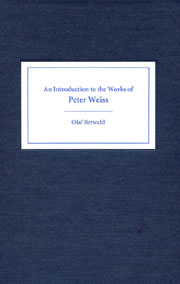Book contents
- Frontmatter
- Contents
- Acknowledgments
- Introduction
- 1 Subversive Slapstick: The Early Plays Der Turm, Die Versicherung, Nacht mit Gästen, and Mockinpott
- 2 The Choreography of Documents: Die Ermittlung, Gesang vom Lusitanischen Popanz, and Viet Nam Diskurs
- 3 Staging Writers as Outcasts: Marat/Sade, Trotzki im Exil, Hölderlin, Der Prozess, and Der neue Prozess
- 4 Scenarios of Stagnation: Early Prose
- 5 Autobiography and Fiction: Abschied von den Eltern, Fluchtpunkt, and Rekonvaleszenz
- 6 Poetics and Politics: Essays, Open Letters, and Fragments
- 7 Perception as Resistance: Die Ästhetik des Widerstands
- Works Consulted
- Index
6 - Poetics and Politics: Essays, Open Letters, and Fragments
Published online by Cambridge University Press: 05 February 2013
- Frontmatter
- Contents
- Acknowledgments
- Introduction
- 1 Subversive Slapstick: The Early Plays Der Turm, Die Versicherung, Nacht mit Gästen, and Mockinpott
- 2 The Choreography of Documents: Die Ermittlung, Gesang vom Lusitanischen Popanz, and Viet Nam Diskurs
- 3 Staging Writers as Outcasts: Marat/Sade, Trotzki im Exil, Hölderlin, Der Prozess, and Der neue Prozess
- 4 Scenarios of Stagnation: Early Prose
- 5 Autobiography and Fiction: Abschied von den Eltern, Fluchtpunkt, and Rekonvaleszenz
- 6 Poetics and Politics: Essays, Open Letters, and Fragments
- 7 Perception as Resistance: Die Ästhetik des Widerstands
- Works Consulted
- Index
Summary
Throughout his literary career, Peter Weiss developed his views on art, politics, and the role of the writer. He published his aesthetic reflections and programmatic interventions in the form of essays, notebooks, open letters, and speeches. They were usually first published in newspapers, small independent theater booklets, or anthologies, and most of them have been collected in his volumes Rapporte (1968) and Rapporte 2 (1971). Weiss's programmatic outlines and analyses of a wide range of works of art are inextricably linked to the composition of his plays and novels. The uneasy relationship between art and politics is discussed in many of his literary works. In his final novel Die Ästhetik des Widerstands, the genre boundary between essay and fiction collapses almost completely.
In his essay “Avantgarde Film,” written in 1955, the year in which he also wrote a book in Swedish, Avantgardefilm (1956), Weiss discusses the mutual amplification and eventual convergence of documentary and surrealist tendencies in Luis Buñuel's films, for example Un Chien Andalou (1929). L'Age d'Or (1930), also by Buñuel, is a film that, according to Weiss's notebooks, taught him to relearn the language of seeing. Weiss also celebrates Buñuel's film Terre sans Pain (1932) as a documentary depiction of poverty in rural Spain that could not be emulated by any surrealist vision.
While the visual arts play a crucial role in his literary works, all creative media are of importance to Weiss.
- Type
- Chapter
- Information
- An Introduction to the Works of Peter Weiss , pp. 99 - 106Publisher: Boydell & BrewerPrint publication year: 2003

